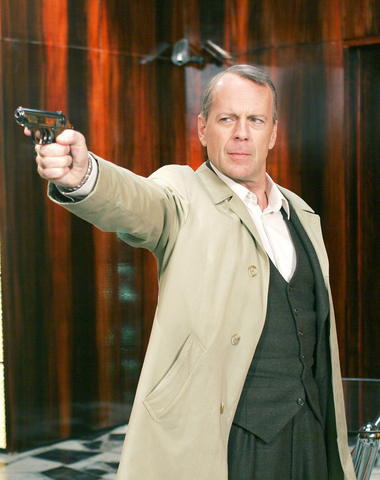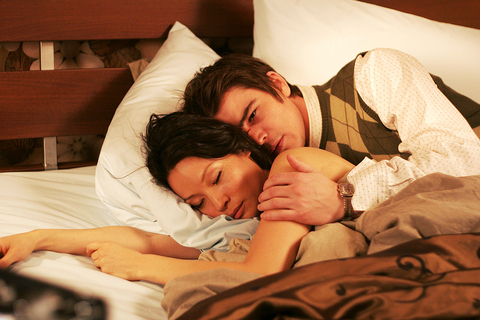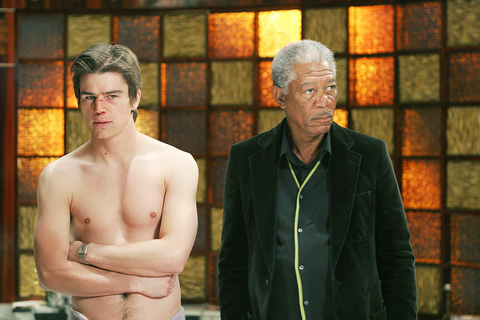Lucky Number Slevin, a shallow, dandified grandson of Pulp Fiction, is the movie equivalent of a junior high school showoff desperate to prove he knows more than the teacher. Frantically raising his hand to answer every question, he exhibits the gleeful self-satisfaction of a quiz kid explaining the theory of relativity.
But because the teacher in this case is Quentin Tarantino, topics like the merits of the various James Bonds, the plot of North by Northwest and the personality of a 1950s cartoon character called the Shmoo are what matters. In the Tarantino school, the pesky loudmouth might get an A. But what good would it do him in the real world?
Digressions on Bond, Hitchcock and the Shmoo are among the trivial pursuits squeezed into this mildly entertaining jigsaw puzzle of mistaken identity and revenge. The movie begins with a jarring rat-a-tat of four gory murders, then spends the rest of its time assembling its pieces into a semi-coherent picture.

PHOTO COURTESY OF FOX MOVIES
Josh Hartnett, as Slevin, stumbles through the movie with a broken nose and his shirt off much of the time, and is the only one of the five male stars who doesn't wear the smirk of a prankster playing an elaborate practical joke at our expense. Besides the director Paul McGuigan (Wicker Park) and the screenwriter Jason Smilovic, the other major conspirators include Morgan Freeman, Ben Kingsley, Stanley Tucci and Bruce Willis. Lucy Liu skips in and out of the movie as a smart, sexy coroner who hooks up with Slevin.
It would be unfair to give away the story's final revelation except to say that early on, Lucky Number Slevin cheats with a deliberately misleading flashback. Were the truth revealed, there would be no movie. That fundamental deception lends Lucky Number Slevin a slightly sour aftertaste.
After its shoot-'em-up intro, the film embarks on a series of hairpin turns, starting with a scene of Willis regaling a stranger with a story about a man who was slaughtered along with his family after he bet on a drugged horse in 1979. The movie flashes back to that race 27 years earlier; just as the horse pulls ahead, it collapses. In a moment of David Mamet-manque, Willis drops an enigmatic reference to the “Kansas City shuffle” that remains hanging until the very end of the movie.

Finally we meet Slevin, who is visiting the New York apartment of his friend Nick. According to Lindsey (Liu), who lives across the hall, Nick hasn't been seen lately. A pair of thugs barge in, rough up Slevin and drag him to the penthouse lair of the Boss (Freeman), a silver-tongued crime lord who couldn't care less that Slevin isn't Nick; all he wants is the US$96,000 owed him.
After nattering on about the Shmoo, the Boss makes Slevin an offer he can't refuse. Either he comes up with the money or he agrees to kill the son of the Boss's former friend and now archrival, the Rabbi (Kingsley), aka Schlomo. Both gangsters are under surveillance by a cop named Brikowski (Tucci in a role that contributes nothing to the movie).
From its sly, amused performances to its surreal comic book gloss to its artfully nervous camerawork, Lucky Number Slevin sustains the blase tone and look of a smart-aleck thriller that buries its heart under layers of attitude. But the same maneuvers Tarantino deploys with the enthusiasm of a true fanatic here are empty gestures. When the movie makes a belated stab at sincerity, it's too little, too late.

A smattering of youngish guys will probably set out to unravel the movie's secrets with the same zeal that drove fans of Memento to piece it together after the fact. For this nonbeliever, deciphering Lucky Number Slevin is not worth spending an extra five minutes.

May 11 to May 18 The original Taichung Railway Station was long thought to have been completely razed. Opening on May 15, 1905, the one-story wooden structure soon outgrew its purpose and was replaced in 1917 by a grandiose, Western-style station. During construction on the third-generation station in 2017, workers discovered the service pit for the original station’s locomotive depot. A year later, a small wooden building on site was determined by historians to be the first stationmaster’s office, built around 1908. With these findings, the Taichung Railway Station Cultural Park now boasts that it has

The latest Formosa poll released at the end of last month shows confidence in President William Lai (賴清德) plunged 8.1 percent, while satisfaction with the Lai administration fared worse with a drop of 8.5 percent. Those lacking confidence in Lai jumped by 6 percent and dissatisfaction in his administration spiked up 6.7 percent. Confidence in Lai is still strong at 48.6 percent, compared to 43 percent lacking confidence — but this is his worst result overall since he took office. For the first time, dissatisfaction with his administration surpassed satisfaction, 47.3 to 47.1 percent. Though statistically a tie, for most

Wooden houses wedged between concrete, crumbling brick facades with roofs gaping to the sky, and tiled art deco buildings down narrow alleyways: Taichung Central District’s (中區) aging architecture reveals both the allure and reality of the old downtown. From Indigenous settlement to capital under Qing Dynasty rule through to Japanese colonization, Taichung’s Central District holds a long and layered history. The bygone beauty of its streets once earned it the nickname “Little Kyoto.” Since the late eighties, however, the shifting of economic and government centers westward signaled a gradual decline in the area’s evolving fortunes. With the regeneration of the once

In February of this year the Taipei Times reported on the visit of Lienchiang County Commissioner Wang Chung-ming (王忠銘) of the Chinese Nationalist Party (KMT) and a delegation to a lantern festival in Fuzhou’s Mawei District in Fujian Province. “Today, Mawei and Matsu jointly marked the lantern festival,” Wang was quoted as saying, adding that both sides “being of one people,” is a cause for joy. Wang was passing around a common claim of officials of the People’s Republic of China (PRC) and the PRC’s allies and supporters in Taiwan — KMT and the Taiwan People’s Party — and elsewhere: Taiwan and